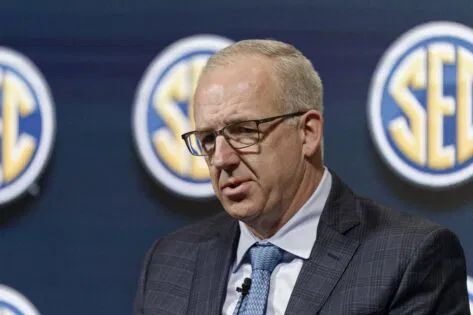
Well, college football fans might already be eager to know more about the SEC playing a nine-game conference schedule starting in 2026. SEC Commissioner Greg Sankey addressed the conference’s decision to shift. As part of the format, each team will face three designated rivals annually. However, Sankey emphasized that this setup isn’t permanent. After a four-year run, the league will revisit and possibly reshuffle those protected matchups. “When we explored this earlier, the phrase was ‘permanent rival.’ So these are annual rivalry games, and we’ve acknowledged that we’ll go through a four-year cycle and take and examine or look deeply,” said Sankey. While fans finally got some clarity, here came another move that leaves them curious.
The SEC has thrived in football under Commissioner Sankey. But seems like he is not satisfied with just leading college football. Even at the top, the SEC is hungry for more. Sankey is set to bring in an Associate Commissioner for Football, pushing the conference’s dominance to another level. Now, what does the job listing say?
On September 15, Sports Illustrated’s Bryan Fischer tweeted, “The SEC is searching for a football czar. League office is set to add a new Associate Commissioner for Football under Greg Sankey, and Parker Executive Search has been retained to help conduct the search for the conference.” Sankey and co. are on a mission to find someone with broad authority to manage and oversee all football-related matters in the SEC. Now, what are they looking for to fill the role of the “Associate Commissioner for Football”?
ADVERTISEMENT
Article continues below this ad
The description for the role as found on the Parker Search Firm site reads: “The Associate Commissioner for Football will provide leadership and oversight for football operations, policy, and stakeholder engagement within the Southeastern Conference. This role serves as the Conference’s primary liaison to head football coaches, football administrators, and national organizations, ensuring alignment with the SEC’s mission and responsiveness to the evolving collegiate athletics landscape.”
ADVERTISEMENT
Article continues below this ad
Sankey and co. have a clear mindset about what they are looking for. The one holding the role will have to look after competition standards, policy advisement on national governance issues that cover NIL, transfer policies, College Football Playoff, and employment models. Other than this, Sankey’s search is for someone who will contribute to the enhancement of officiating and scheduling practices and advance student-athlete welfare and program integrity. Now, what’s the future of this role?
Greg Sankey’s search for a new face in the SEC while sitting in the hot seat
The position could serve as a potential pathway to eventually succeed Sankey. The 61-year-old has led the SEC as commissioner since 2015, following Mike Slive, making him the eighth person to hold the post in the conference’s history. Sankey has set the standard quite high. Under his leadership, the SEC has secured six football national championships: three by Alabama, two by Georgia, and one by LSU.
Associate Commissioner is the role that Sankey took up in 2002, setting foot in the SEC. That period marked a time when the conference faced compliance challenges. Sankey’s contract got extended in July 2023 and will keep him in his position through at least 2028. While the search for his eventual successor begins, he has landed in a sticky spot.
ADVERTISEMENT
Article continues below this ad
On September 7, Congressman Michael Baumgartner tweeted, stirring Sankey’s pot, “If you care about the future of college sports, you should write to SEC Commissioner Greg Sankey and Big Ten Commissioner Tony Petitti and tell them to stop their big ego, bullying approach to the college sports landscapes. These two guys are going to burn the whole thing down with their selfish approach to squeezing out every last dollar from everyone else.” Now, what was the hoopla all about?
Greg Sankey allegedly sent an email to the commissioners of the Group of Six conferences that later leaked publicly. It drew backlash for its dismissive and condescending tone. Critics argue that Sankey’s email implied smaller conferences should remain on the sidelines while the power conferences dictate the direction of college sports. With this, he effectively pressured G6 leaders to stay silent during major governance decisions. Sankey’s seat isn’t cooling yet, but the search for who will next shape SEC football is on.



